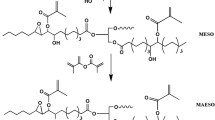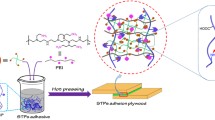Abstract
Fabrics with various patterns and textures can be used to decorate the surface of wood and/or wood composites, enriching indoor environments and reflecting a consumer’s personal taste. To adhere fabric to wood, an environmentally friendly defatted soybean meal (DSF)-based adhesive was modified by adding seven different types of inorganic fillers. The effects of optimal filler composition and concentration on adhesive performance were evaluated by X-ray diffraction, Fourier transform infrared spectroscopy, scanning electron microscopy, and other techniques. Test results indicated that organokaolin improved the bond properties and usefulness of DSF-based adhesives for decorating wood composites with cotton fabric owing to the even distribution of organokaolin in the adhesive and reinforcement by intercalated filler particles. The cotton fabric bonded to the wood by the optimal DSF-based adhesive had a water resistance that withstood a boiling-water test and maintained a wet peel strength of 0.96 N/mm. However, an excess of organokaolin filler resulted in the formation of loose organokaolin aggregates and reduced crosslinking density of the DSF-based adhesive, which reduced the bond properties. The optimal organokaolin concentration in the DSF-based adhesive was 30 wt%, correlating to a 10.3 % cost reduction compared to an unfilled adhesive.









Similar content being viewed by others
References
Arasi MA, Salem A, Salem S (2020) Nano-porous hydrosodalite fabrication via hydrothermal modification of processed kaolin by boehmite: aluminum source effect on physico-chemical characteristics of product. Adv Powder Technol 31:2379–2384
Bich C, Ambroise J, Péra J (2009) Influence of degree of dehydroxylation on the pozzolanic activity of metakaolin. Appl Clay Sci 44:194–200
Chang Z, Sun Z, Wu W, Chen T, Gao Z (2019) Effects of inorganic filler on performance and cost effectiveness of a soybean-based adhesive. J Appl Polym Sci 137:48892
Chen P, Zhang L (2006) Interaction and properties of highly exfoliated soy protein/montmorillonite nanocomposites. Biomacromology 7:1700–1706
Chen J, Chen X, Zhu Q, Chen F, Zhao X, Ao Q (2013) Determination of the domain structure of the 7S and 11S globulins from soy proteins by XRD and FTIR. J Sci Food Agric 93:1687–1691
Gui C, Wang G, Wu D, Zhu J, Liu X (2013) Synthesis of a bio-based polyamidoamine-epichlorohydrin resin and its application for soy-based adhesives. Int J Adhes Adhes 44:237–242
Guo LM, Wang WH, Wang QW, Yan N (2018) Decorating wood flour/HDPE composites with wood veneers. Polym Compos 39(4):1144–1151. https://doi.org/10.1002/pc.24043
Hemmil V, Adamopoulos S, Karlsson O, Kumar A (2017) Development of sustainable bio-adhesives for engineered wood panels–a review. RSC Adv 7:38604–38630
Janek M, Emmerich K, Heissler S, Nüesch R (2007) Thermally induced grafting reactions of ethylene glycol and glycerol intercalates of kaolinite. Chem Mater 19:684–693
Kandelbauer A, Petek P, Medved S, Pizzi A, Teischinger A (2010) On the performance of a melamine-urea-formaldehyde resin for decorative paper coatings. Eur J Wood Prod 68:63–75
Khojasteh–Khosro S, Shalbafan A, Thoemen H (2020) Preferences of furniture manufacturers for using lightweight wood–based panels as eco–friendly products. Eur J Wood Prod 78:593–603
Kumar A (2020) Lingfa P (2020) Sodium bentonite and kaolin clays: comparative study on their FT-IR, XRF, and XRD. Mater Today Proc 22:737–742
Kumar R, Choudhary V, Mishra S, Varma IK, Bo M (2002) Adhesives and plastics based on soy protein products. Ind Crops Prod 16:155–172
Li K, Peshkova S, Geng X (2004) Investigation of soy protein-Kymene® adhesive systems for wood composites. J Am Oil Chem Soc 81:487–491
Li H, Li C, Gao Q, Zhang S, Li J (2014) Properties of soybean-flour-based adhesives enhanced by attapulgite and glycerol polyglycidyl ether. Ind Crops Prod 59:35–40
Liu Y, Shen J, Zhu XD (2015) Evaluation of mechanical properties and formaldehyde emissions of particleboards with nanomaterial-added melamine-impregnated papers. Eur J Wood Prod 73:449–455
Luo J, Li X, Zhang H, Gao Q, Li J (2016) Properties of a soybean meal-based plywood adhesive modified by a commercial epoxy resin. Int J Adhes Adhes 71:99–104
Lv J, Fu R, Liu Y, Zhou X, Wang W, Xie P, Hu T (2020) Decorative wood fiber/high-density polyethylene composite with canvas or polyester fabric. J Renew Mater 8:879–889
Sperinck S, Raiteri P, Marks N, Wright K (2011) Dehydroxylation of kaolinite to metakaolin-a molecular dynamics study. J Mater Chem 21:2118–2125
Sun K, Shi Y, Wang X, Rasmussen J, Li Z, Zhu J (2017) Organokaolin for the uptake of pharmaceuticals diclofenac and chloramphenicol from water. Chem Eng J 330:1128–1136
Sun T, Ge K, Wang G, Geng H, Shui Z, Cheng S, Chen M (2019) Comparing pozzolanic activity from thermal-activated water-washed and coal-series kaolin in Portland cement mortar. Constr Build Mater 227:117092
Tironi A, Trezza MA, Scian AN, Irassar EF (2012) Kaolinitic calcined clays: factors affecting its performance as pozzolans. Constr Build Mater 28:276–281
Vnučec D, Kutnar A, Goršek A (2017) Soy-based adhesives for wood-bonding-a review. J Adhes Sci Technol 31:910–931
Wang SY, Su DZ, Zhu SF (2016) A comparative study on life cycle assessment of typical wood base furniture. Atlantis Press, Paris, pp 634–640
Wang F, Wang J, Chu F, Wang C, Jin C, Wang S, Pang J (2018) Combinations of soy protein and polyacrylate emulsions as wood adhesives. Int J Adhes Adhes 82:160–165
Xi X, Pizzi A, Gerardin C, Chen X, Amirou S (2020) Soy protein isolate-based polyamides as wood adhesives. Wood Sci Technol 54:89–102
Xiong X, Ma Q, Yuan Y, Wu Z, Zhang M (2020) Current situation and key manufacturing considerations of green furniture in China: a review. J Clean Prod 267:121957
Xu Y, Han Y, Shi S, Gao Q, Li J (2020) Preparation of a moderate viscosity, high performance and adequately-stabilized soy protein-based adhesive via recombination of protein molecules. J Clean Prod 255:120303
Yang Z, Zhang X, Liu X, Guan X, Zhang C, Niu Y (2017) Polyglycerol-based organic-inorganic hybrid adhesive with high early strength. Mater Des 117:1–6
Zdravkovic V, Palija T, Lovric A, Obradovic A (2020) Impact of pressing regime and substrate type on bond quality of decorative veneer. Bioresources 15:2668–2679
Zhang B, Chang Z, Li J, Li X, Kan Y, Gao Z (2019) Effect of kaolin content on the performances of kaolin-hybridized soybean meal-based adhesives for wood composites. Compos Part B 173:106919
Acknowledgements
This work was supported by the National Natural Science Foundation of China (Grant number 31870542), and the Fundamental Research Funds for the Central Universities in China (Grant number 2572020DR13).
Author information
Authors and Affiliations
Corresponding author
Ethics declarations
Conflict of interest
The authors declare that there is no conflict of interest.
Additional information
Publisher’s Note
Springer Nature remains neutral with regard to jurisdictional claims in published maps and institutional affiliations.
Rights and permissions
About this article
Cite this article
Bai, Y., Li, J., Shen, J. et al. Properties of an organokaolin-modified soybean meal-based adhesive used for adhering cotton fabric to wood composites. Eur. J. Wood Prod. 79, 1633–1644 (2021). https://doi.org/10.1007/s00107-021-01727-w
Received:
Accepted:
Published:
Issue Date:
DOI: https://doi.org/10.1007/s00107-021-01727-w




